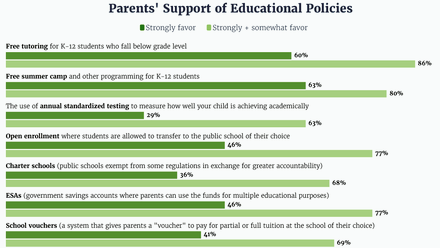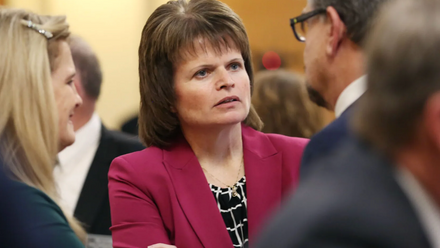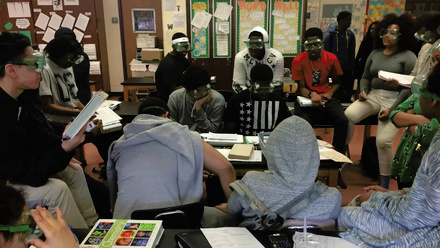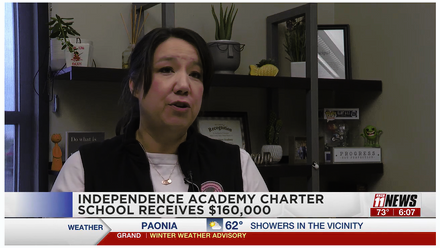Raise Your Voice for NCSW
Why? Because we are louder together. We are united. We are public schools. We are charter. Mark your calendars, share your stories, and join the fun this National Charter Schools Week (NCSW).
- Monday, May 13: Celebrate this year’s seven Changemakers, individuals recognized by the National Alliance for raising their voices. PS: One dedicated Colorado charter leader made the list!
- Tuesday, May 14: Read the 2024 Charter Schools Program (CSP) Impact Report, reminding us all of why we fight for our schools and for public funding.
- Wednesday, May 15: Hear from the 2024 Changemakers at an event in Washington, D.C. and learn why they raise their voice for charters. Join the Facebook Livestream at 9AM MT.
- Thursday, May 16: Listen to the first episode in Season 2 of the Get Schooled in Public Education Podcast.
- Friday, May 17: Share far and wide why we raise our voice for charter schools with #CharterLove.
Spread the Word
Incorporate these talking points into your communications about NCSW.
Quick Hits:
- Raise your voice for charter schools and public education.
- We are louder/stronger/better together.
- Nearly 4 million students strong!
- Charter schools raise the bar in public education.
- Charter schools lead innovation and growth in public education.
- Every family should have access to a high-quality public education–charter schools deliver on this promise.
- We are innovation in public education. We are community builders. We are public charter schools!
- I raise my voice for charter schools because_____.
General Talking Points:
- Charter schools are always public, always free, and always open to all students.
- Charter schools are an important part of the American education landscape serving nearly 4 million students—two-thirds of whom are from low-income, Black or Latino communities.
- 251,000 dedicated teachers working in 8,000 schools and campuses across the country.
- All students and families deserve access to a high-quality public education.
- The nation’s 8,000 public charter schools are committed to ensuring that happens—providing a free, student-centered learning environment to nearly four million students, the majority of whom are Black, Brown, and from low-income communities, and millions more families who are hoping to have the same opportunity.
- Charter schools are the only part of public education that is steadily growing.
- Over the last four school years (2019-20 to 2022-23), charter schools gained more than 300,000 new students, an increase of 9%. Meanwhile, district public schools lost 1.5 million students at the beginning of the pandemic and enrollment has not rebounded over the past three years, creating a net loss of 3.5%.
- Where there is space, families want seats in charter schools.
- American parents across the political spectrum are broadly supportive of charters: 73% of parents with school-aged children expressed their approval of charter schools in a recent poll and 93% agree that one size does not fit all in education, according to a recent survey of parents by The Harris Poll.
- Charter schools are student-centered and can serve the unique needs of each of their communities in ways that traditional public schools cannot.
- In exchange for local autonomy regarding students’ education and wrap-around services, charter schools must meet or exceed the goals laid out in their charter such as student proficiency and community service.
- Families choose public charter schools in part because they are often run by community leaders and former teachers who want the autonomy to make decisions to best meet the unique needs of their students and their families.
- Public charter schools are an important part of the public education community. These unique public schools serve 3.7 million learners—nearly 70% students of color—and the teaching staff reflects this diversity.
- According to the National Center for Education Statistics, nearly one in three charter school teachers and school leaders are educators of color.
- This exceptional group of educators can do what many thought impossible: educate students from all backgrounds and support them to achieve academic success.
- The Charter Schools Program (CSP) is the only source of federal funding for start-up, replication, and facilities for public charter schools. We call on congressional leadership to increase funding and flexibility to support access to facilities and support educators, including educators of color, who are inspired to open new schools.
- There are two bills before Congress to increase the effectiveness and accessibility of the CSP:
- The bipartisan Equitable Access to School Facilities Act (S. 1480) will ensure access to public property and provide federal grants to states for charter school facilities. The grants, available from the CSP, can be used by charter schools to acquire and renovate existing facilities, cover ongoing facilities costs, or create a reserve fund for future acquisition, renovation, or maintenance. Additional CSP funding will remove financial barriers to starting new schools and expanding existing high-performing schools. All public school students should have the right to learn in a safe, clean, and functional environment.
- The Empower Charter School Educators to Lead Act (H.R. 6418 and S. 3072) would allow state grantees to allocate CSP grant funding for pre-planning grants for school leaders and educators looking to start high-quality public charter schools. The funds in this bill are intended to help equalize the opportunity for educators and school leaders who want to open a charter school but lack access to resources needed to navigate the complex process and planning costs required to submit a high-quality charter school application. This public support may be especially valuable to educators of color, from low-income backgrounds, or in rural areas who may have less access to philanthropic support.
Share on Social Media
-
Use the Alliance’s social media graphics throughout the week
-
Use #CharterSchoolsWeek and/or #WeAreCharter in your social posts
-
Use the Alliance’s social media language or make up your own:
-
Join me in celebrating National #CharterSchoolsWeek 2024! Raise your voice for the 8,000 schools and nearly 4M students who attend them this week and every week #WeAreCharter
-
We are more than educators, leaders, students, and schools. We are a movement. And we are growing. #CharterSchoolsWeek #WeAreCharter
-
We are louder together! Stand strong with a growing movement for choice in public education #CharterSchoolsWeek #WeAreCharter
-
And More
- Meet the press. Send out a press release for any event you are hosting that week or to generate additional awareness, particularly with your local media.
- Write an Op-Ed. An Op-Ed (opinion editorial) is a prose piece typically published by a newspaper or magazine that expresses an opinion with the intention of convincing its readers of a specific position. Learn how to publish, when to submit, and what to write.






